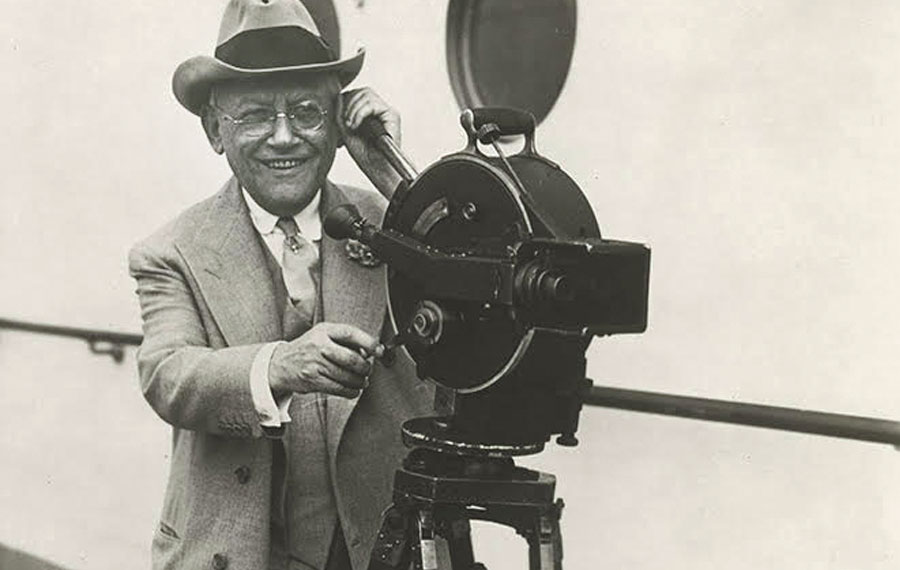
“Carl Laemmle” is an inspired choice for the opening presentation of this year’s Los Angeles Jewish Film Festival because in many ways, the film and its protagonist embody the Jewish experience in America.
There is the penniless immigrant who pulls himself up by his bootstraps to become a mogul; the Jew as creator of Hollywood and the film industry; the overcompensating Jew as a 200% American; the liberal trailblazer; and the rescuer (or rejector) of his persecuted brethren in Europe.
Director, writer and producer James L. Freedman has woven together the threads to resuscitate the life and achievements of Carl Laemmle — a giant of a man at 5 feet 2 — who arrived in the United States from the southern German town of Laupheim as a 17-year-old. Laemmle went on to pioneer the Hollywood studio, battle monopolies, empower women, make the ultimate anti-war film, invent the monster movie and enable hundreds of Jews to flee Nazi Germany.
Freedman had just finished a documentary on another Jewish icon, athlete and sportscaster Marty Glickman, when he chanced on an article about the Motion Picture Patents Co., whose most prominent member was inventor Thomas Edison. Among other cutting-edge inventions, Edison had come up with the Kinetograph, the first motion picture camera, and fiercely attacked anyone who threatened his patent monopoly.
Edison sued upstart Laemmle 289 times in U.S. courts, and hired goons to break up the filming by competitors. Laemmle protected his people by enlisting the Jewish Mafia as protectors.
As he got deeper into his new film project, Freedman told the Journal, in an interview at his Beverly Hills home, that he realized “there was no better time than now to make a movie abut immigrants trying to reach America.”
Despite the presence of a Laemmle chain of movie theaters in the greater Los Angeles area, founded by relatives, Freedman quickly discovered that hardly any contemporaries had heard of Carl Laemmle.
Even Universal Studios, founded by Laemmle in 1912 on a 320-acre site in the then-isolated San Fernando Valley, was recently unable to respond to a request for a photo of its founder.
There was little indication of Laemmle’s future success when the greenhorn arrived in the United States in 1886 and initially settled in Chicago.
He worked first as an errand boy for a pharmacy, then a farmhand and ultimately as the manager of a small clothing store. But at 30, he was still selling newspapers on the street to supplement a small income.
Raised on the universal myth that in America the streets were paved with gold, another immigrant might have been discouraged, but not Laemmle. “Throughout his life, Laemmle lived by the motto ‘It can be done.’ ” — James Freedman
Raised on the universal myth that in America the streets were paved with gold, another immigrant might have been discouraged, but not Laemmle. “Throughout his life, Laemmle lived by the motto ‘It can be done,’ ” Freedman said.
As studio head, Laemmle launched the careers of the “Boy Wonder” film executive Irving Thalberg; directors John Ford and William Wyler; and actor Rudolph Valentino among may others. He also pioneered the Hollywood star system and the studio tour (at 25 cents a head), during which the public could watch how movies were made.
Laemmle’s major breakthrough came with the purchase of a nickelodeon, where ordinary folks could watch one-reel episodes of moving pictures.
Perhaps even more remarkably, Laemmle made it a point to hire and promote women among his employees. Shortly after Universal’s founding, Laemmle employed 30 female directors and 45 female screenwriters.
In subsequent decades, there were times when Laemmle compromised his convictions, but mostly he stood up for his beliefs. One testing time was during World War I. Laemmle produced a number of short anti-German films, with such titles as “The Kaiser — Beast of Berlin.”
Despite the advice of cautious assistants, Laemmle turned the 1929 German anti-war novel “All Quiet on the Western Front” into a powerful movie, which Nazi goons would howl down when it was shown in the early 1930s.
Laemmle rose to his finest hour after Hitler came to power and Jewish refugees sought entry and employment in the United States. While other Jewish studio heads sat on their hands, proclaiming that as “Americans” they would not get involved in rescue efforts, Laemmle lobbied persistently and underwrote the entry of some 300 Jewish families from Germany.
During the 1930s, Laemmle spent 80% of his time rescuing Jews until his death at 72 in 1939, at the dawn of World War II.
In making his film, Freedman said he avoided drawing any inferences to current politics in the United States, but ended the film with a screen-filling shot of the Statue of Liberty.
“Carl Laemmle” will be screened at the opening night gala of the Los Angeles Jewish Film Festival at 8 p.m. May 2 at Ahrya Fine Arts in Beverly Hills, 8556 Wilshire Blvd., Beverly Hills. A red carpet arrival and reception begins at 7:15 p.m. Freedman and other special guests will participate in a Q&A and director, writer and actor Peter Bogdonavich will be honored with the Marvin Paige Hollywood Legacy Award. For information on the weeklong film festival, a program of the Jewish Journal, check with LAJFilmFest.org, or phone (800) 838-3006.























 More news and opinions than at a Shabbat dinner, right in your inbox.
More news and opinions than at a Shabbat dinner, right in your inbox.